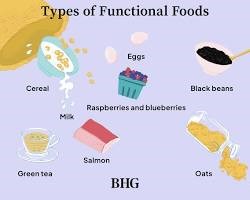
Functional foods are those that provide health benefits beyond basic nutrition. They often contain bioactive compounds that can positively affect various bodily functions. Here are 10 examples of functional foods:
- Turmeric: Contains curcumin, known for its anti-inflammatory and antioxidant properties. It may help reduce inflammation and support joint health.
- Green Tea: Rich in catechins, particularly epigallocatechin gallate (EGCG), which has antioxidant properties that may help protect cells from damage and support cardiovascular health.
- Yogurt and Probiotic Foods: Contains probiotics, beneficial bacteria that support gut health and may enhance immune function. Examples include yogurt, kefir, and fermented vegetables like sauerkraut.
- Berries: Blueberries, strawberries, and other berries are rich in antioxidants like anthocyanins, which may help protect against oxidative stress and inflammation.
- Oily Fish: Salmon, mackerel, and sardines are high in omega-3 fatty acids, which are beneficial for heart health, brain function, and reducing inflammation.
- Garlic: Contains allicin, a compound with potential cardiovascular benefits, including lowering blood pressure and cholesterol levels.
- Nuts and Seeds: Almonds, walnuts, flaxseeds, and chia seeds are rich in healthy fats, fiber, and antioxidants. They may support heart health and help regulate blood sugar levels.
- Oats: Rich in soluble fiber, oats can help lower cholesterol levels and improve digestive health. They also provide sustained energy due to their complex carbohydrates.
- Dark Chocolate: Contains flavonoids, which have antioxidant properties that may help improve heart health by reducing inflammation and improving blood flow.
- Leafy Greens: Spinach, kale, and other leafy greens are rich in vitamins, minerals, and phytochemicals. They support overall health and may help reduce the risk of chronic diseases.
These functional foods can be easily incorporated into a balanced diet to provide additional health benefits beyond basic nutrition.
